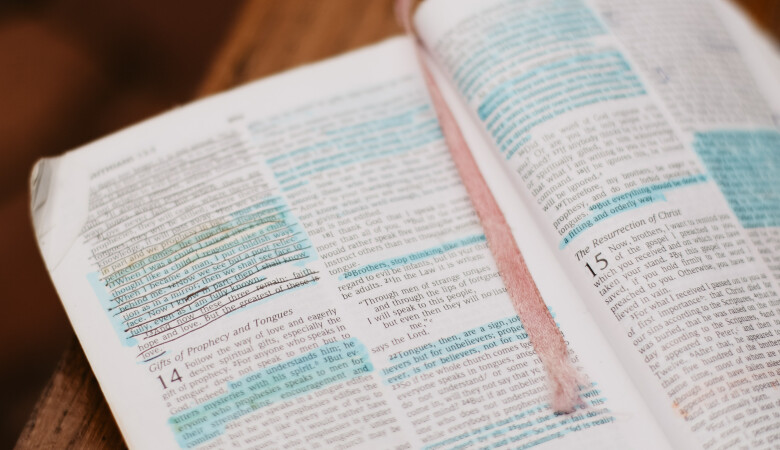Series: Psalms
Blessed by Fruitfulness in 2023
January 01, 2023 | Andy Davis
Psalms 1:1-6
Abiding in Christ
An invitation to renew your commitment to feeding yourself with God's word throughout the upcoming year.
- Sermon Transcript -
I wish all of you a happy New Year. I'd like to ask that you turn in your Bibles to Psalm 1. We're going to just do a single sermon to begin the new year on the importance of the word of God. Every time I get up here to preach, every time I stand here in the pulpit, my desire is to feed First Baptist Church with the Word of God. I think often of the exhortation that Jesus gave to Simon Peter after his resurrection as he was I believe restoring Peter back to ministry after Peter had denied him three times. He asked him three times, "Do you love me?" And he said, "I do love you." And then He said effectively, "Feed my sheep." That's an incredibly important calling. Because earlier in John's gospel, Jesus said that He is a good shepherd and laid down his life for the sheep. The sheep are precious to Jesus, and He shed his blood for them.
But for Peter as an under shepherd, under the great shepherd, the good shepherd, to be tasked with the responsibility of feeding Christ's sheep is weighty. In due time, Peter died and went on to be with the Lord, but left behind an epistle, First Peter, in which he exhorted elders to take his place and to do that kind of shepherding ministry and feeding ministry.
I think often of that. I meditate on what does it mean to feed the sheep? Ultimately it comes down to the ministry of the Word of God. All of you are sheep. You are followers of Christ because you have believed the Word. Because you have heard the gospel and believed it. But there is a need that all of you have for ongoing feeding, so the pastors of this church are committed to feeding your faith, week after week, to feed you.
But today in the meditation on Psalm 1, I want to urge all of you, sheep, to feed yourselves. I want you to be active in 2023 to feed yourselves. I actually think in the end, the feeding you'll do of yourself will be more significant, certainly more voluminous than any feeding we can do in the brief time we have here in the ministry of the Word. That's why I wanted to turn to Psalm 1.
I. Exploring Your Root System
As we're looking at Psalm 1, we have an image of a tree planted by streams of water. The roots are not mentioned, they are implied. The idea is that this tree planted by streams of water, has ready access to everything it needs for life and fruitfulness because of its proximity to the stream. The idea here is a concept of a root system, and the proximity to the Word of God.
As a homeowner, I have had the opportunity over 25 years living in my home, of studying the roots of certain trees in my yard. Some of them to me are quite dominant. There's a part of my lawn I can't mow anymore because over 25 years, the hardwood tree there, its roots have emerged above the surface of the ground. They're so high now, the only thing I can do is get at them with a weed whacker. I don't know why grass still grows in and around them, but it does. There's also a tree near my driveway where we put up a basketball court sometime ago, and its roots are causing the driveway to, I don't know what to say, ripple. I've had someone look at the driveway and they said, "Well, I can't really do anything for you until you remove that tree." I don't want to remove that tree. So the roots are going to continue to ripple, I guess, my driveway.
What's going on there is that this subterranean root system of the tree is relentlessly, with great force, seeking what it needs to survive. Seeking water, and seeking nutrients from the soil. My question to you this morning is what is your spiritual root system? What's going on behind the scenes in your life? More specifically, what are your habits with the Word of God? What are your habits with the Word of God? Are you regularly taking advantage of the remarkable proximity all of you have to the Word of God? You have a proximity that has never been equaled in all of church history. The ease with which all of us have to the Word of God is remarkable. It has come at great cost, brothers and sisters, in previous generations. But now we have it, and we have axes. The question is, what are you doing with it?
Jesus told us earlier is our study as we walked through the Gospel of Mark, not today, but we've been making progress. There was a set of parables that Jesus told in Mark chapter 4, centered on the ministry of the gospel. The most important of these parables, the first one He told was the parable of the seed in the soils. The farmer went out to sow a seed and it landed on different types of soils.
The second soil was the stoney ground-hearer. Hear again, the words of Mark 4: 5-6, "Some of the seed fell on rocky places where it did not have much soil. It sprang up quickly because the soil was shallow. But when the sun came up, the plants were scorched, and they withered because they had no root."
He then explained this type of hearer in Mark 4:16-17, "Others like seed sown on rocky places hear the word and at once receive it with joy. But since they have no root, they last only a short time. When trouble or persecution comes because of the word, they quickly fall away." The context there seems to be hostility to the Word. Persecution by a hate-filled world, which assaults that plant that's growing up and causes it to die, because it doesn't have that subterranean, hidden root system. But Jesus doesn't specify what the trouble is. We are in a hostile environment as believers. The world, the flesh, and the devil constantly assaulting our souls, and if we don't have a developed root system, we are going to die.
We are not in such a context of overt persecution in our culture, not yet. It may be coming within our lifetime. It may certainly come within our children's lifetime, where American culture will become aggressively anti-Christian. It'll be very difficult for you to live an open, faithful Christian life, as many of your brothers and sisters around the world are facing, and many have in past generations as well. However, we are under siege. We are assaulted, as I said by these three enemies. Constantly, the world, flesh and the devil. So you must have a developed root system.
II. The Promise of Overwhelming Blessing
Psalm 1 gives you a picture, an image in your mind of that nourishing that you need and that access to the Word of God, which will keep you alive and fruitful. Psalm 1 starts with a promise of overwhelming blessing. Look at Psalm 1, verse 1. The first verse of the psalter, the book of Psalms. As you're stepping into the world of the Psalms, an amazing world, 150 Psalms, the sign over the doorway kind of metaphorically as you walk in is “Blessed”. “Blessed are the people, blessed is the man.” That's the thing.
The psalter is God's prayer book by which He instructs all of us how we should pray. It also addresses every emotional state that could ever happen in the Christian life. All of these things are addressed in the 150 Psalms. But fundamentally, the 150 Psalms as we take to heart and we pray them back to God and live out their wisdom, is an instruction manual on how to live a blessed life, both now and eternally. A blessed life. The sign as you enter is the word “Blessed”. Similar by the way to Jesus' teaching ministry in the New Testament, which begins with in the Sermon of the Mount, the beatitudes. The “blessed are”, “the blessed”, “ blessed”, blessed statements that Jesus makes at the beginning of his teaching ministry. Matthew 5:3, "Blessed are the poor in spirit, for theirs is the kingdom of heaven."
This concept of blessedness, what does that mean? What does it mean to be blessed? The Hebrew word in Psalm 1 is “baruch”. It's a beautiful word. It simply means happy, but a rich happiness, a spiritual happiness, a deep happiness, not a temporal fleeting mist in the morning type of happiness. But a deep, rich, full happiness in the Lord. That's what the word “blessed” means to me. The God of the Bible instructs us his followers on how we can have a blessed, happy, rich, deep fruitful life in him.
"The God of the Bible instructs us his followers on how we can have a blessed, happy, rich, deep fruitful life in him. "
This word “blessed" brings us into the concept of the old covenant blessings and curses, which was very prominent in the old covenant. God was constantly setting before the Israelites a choice— blessings and curses. Will you be blessed or will you be cursed? Will you live a blessed life or will you not? The blessings are defined in the old covenant, frequently and very physical, even agricultural sort of ways because that was their society. In Deuteronomy 28:3-8, it says, "You'll be blessed in the city, blessed in the country. The fruit of your womb will be blessed, and the crops of your land, and the young of your livestock. The calves of your herds and the lambs of your flocks. Your basket and your needing trough will be blessed. You'll be blessed when you come in and blessed when you go out. The Lord will grant that the enemies who rise up against you will be defeated before you. They'll come at you from one direction, but flee from you in seven. The Lord will send a blessing on your barns and on everything you put your hand to. The Lord your God will bless you in the land he has given you." That's a comprehensive sense of blessedness that the people of God would experience, if they would just obey the covenant.
In the new covenant however, the blessings become richly spiritual. It's not like the physical doesn't matter, it does. But we are instructed in the blessings of the new covenant in a spiritual sense. Ephesians 1: 3- 4 captures that as well, “Praise be to the God and father of our Lord Jesus Christ, who has blessed us in the heavenly realms with every spiritual blessing in Christ.” It's overtly spiritual there. The new covenant blessings are spiritual blessings. What are those blessings? We could go on and on listing them. They begin with full forgiveness of sins. All of your sins, past, present, future forgiven by God. And adoption into God's family, that you are called a son or daughter of the living God forever, with a permanent place in the family. And the indwelling Holy Spirit, to testify to your spirits that you are a child of God, to lead you, and guide you, and convict you of your sins and to help you and instruct you in the Word of God. Peace with God through our Lord Jesus Christ. He's not your enemy anymore. He's your ally, your friend. Peace with God.
Freedom from all condemnation. “There's no condemnation for those who are in Christ Jesus.” No fear of hell, we will not be condemned. We will not hear those dreadful words “Depart from me you who are cursed into the eternal fire.” We're free from that fear. There is guaranteed resurrection in a glorious body, and our bodies are going to shine like the sun in the kingdom of our Father. The promise of a perfect life and a perfect world in the new heaven, new earth with all of the redeemed. Brothers and sisters in Christ from every tribe, language, people, and nation, from every era of church history, there with us as well, and the blessings of a good and fruitful life here on earth before we ever die. The blessedness of the Christian life now. All of these things are ours.
We're able by obedience to the Word of God to store up treasure in heaven every day. That means that every day, including today, you can serve God and do good works which He has prepared in advance for you to walk in. By doing those good works, you'll store up treasure in heaven. Now that's a blessed life, dear friends. And that's what I have in mind when I think of the word “blessed”. “Blessed is the man who . . .etc.” Faith filled obedience to the Word of God, biblically, is essential to all of this, to the blessedness that God intends to give up. If we hear and obey God's word, we step into these blessings in no other way. Deuteronomy 32:47 therefore says, "The words of the covenant are not just idle words for you, they are your life." So that's why we need to constantly minister the word of God to ourselves and be ministered to. You need to be fed by this pulpit. You need to be fed by the pastors of this church. But then day by day, you need to feed yourself in the Word because the blessedness comes from the ministry of the word of God.
Psalm 1 then begins, and it begins negatively. It begins essentially with a way that hates evil. Verse 1, "Blessed is a man who does not,” does not, does not. It starts out negatively, “The man who does not walk in the council of wicked, or stand in the way of sinners, or sit in the seat of mockers.” It's not enough for me to just be up here saying happy, positive things. We're in a sin cursed, fallen world. We have to deal with the evil of this world if we want to be blessed, so the psalmist begins negatively. We have to wage war against sin while we live.
The psalmist introduces us right away to the two different ways to live. The way of the righteous is directly contrasted with the way of the wicked. Amazingly, he describes the purity of the righteous man from all the evil influences of people in this world. “Blessed is the man who does not walk in the council of the wicked, or stand in the way of sinners, or sit in the seat of mockers.” He does not walk in that way. It's a Hebrew expression of daily lifestyle. What is your daily lifestyle? What are your habits, the habits of your life? The choices you make every single day.
The year 2023 is, for the most part, in front of you. Most of the events of 2023 haven't happened for you yet. I don't know what time you went to bed last night. I tend to make it a habit to try to go to bed before midnight on New Year's Eve, because I lost interest in New Year's Eve years ago. But others of you, you love to stay up. Great, that's fine. Some of you stayed up to watch some football games I've heard. But at any rate, that's what you all did. That's fine. But the year, if God allows you to live, is in front of you, and it's going to be defined by choices you make, good or bad.
What choices are you going to make? How will you walk? What path will you walk in? Your wise or foolish choices will dictate your level of blessedness in Christ. The righteous man of Psalm 1 does not walk in the council of the wicked. He's not imitating wicked people who live for the lust of the eyes, and the lust of the flesh, and the boastful pride of life. He's not walking in their council, he's not seeking advice. "How shall we live? What shall we do? Tell me what to do." He doesn't want it. He's not interested in the council of the wicked, and doesn't walk in the way they walk. He doesn't stand in the way of sinners. He's nothing near that lifestyle. He doesn't want any part of that kind of lifestyle. He doesn't sit in the seat of mockers. Our age as really every age is one of mocking holy things, of mocking Jesus, of mocking the Bible, of mocking purity, of mocking holiness. You get this in popular culture, on social media platforms, and standup comedians, and late night hosts. They just make a living mocking Christianity. That's been going on a long time. Just go back to Voltaire in the 18th century, he was a great mocker. Some of the thinkers of that day, Thomas Paine, Benjamin Franklin, Thomas Jefferson, Mark Twain, they're all mockers. They made a lot of money mocking religious things.
"Your wise or foolish choices will dictate your level of blessedness in Christ."
In the 20th century, a man named H. L. Mencken raised mocking of holy things of God to an art form. He said this. "What is the function that a clergyman performs in the world?" Answer: "He gets his living by assuring idiots that he can save them from an imaginary hell.” I want you to know that's not why I came here today. I hope it's not why you came here today. To continue with H. L. Mencken, "The liberation of the human mind has never been furthered by dunderheads. It has been furthered by gay fellows who heaved dead cats into sanctuaries, and then went roistering down the highways of the world proving to all men that doubt after all was safe. That the God in the sanctuary was finite in his power, and hence a fraud. One horse laugh is worth 10,000 syllogisms. It is not only more effective. It is also vastly more intelligent."
He's just celebrating the people that heave dead cats into sacred ground, and run away, and show they can get away with it. Mencken also said, "We must respect the other fellow's religion, but only in the sense and to the extent that we respect his theory that his wife is beautiful and his children are smart." I mean, that's just sarcasm. It's mockery, it's unkindness. I wouldn't want a man like this as my friend. Psalm 1 says, “I'm staying away from a person like this. I'm staying away from this type of mocking.”
We should not be surprised at it, it’s part of every era. It's part of our era as well. In II Peter 3:3, Peter said, "First of all, you must understand that in the last days, scoffers will come scoffing and following their own evil desires." This is part of the last days. We also should remember this. Galatians 6:7 says this, "Do not be deceived. God cannot be mocked. A man reaps what he sows."
It's impossible to mock God. He is so infinitely above our mockery. He sits on a throne of light infinitely above everything He has made, and there is nothing we can do to pull him from his throne. Our mocking of him doesn't change him at all. We're really just mocking our own souls, because we reap what we sow. Now, Psalm 1 is clear. Blessedness in life comes from staying away from that whole mindset. The lifestyle of the ungodly. While we cannot avoid daily interaction with non-Christians and actually don't seek to, we are commanded to be light in the world. We're commanded to be witnesses for the love of God in Christ. We are to avoid following the ways and philosophies of this world.
III. The Roots of Eternal Fruitfulness: Meditation on God’s Word
Instead, by contrast, the way of blessedness is a way immersed in the Word of God. It's immersed in the Word of God. Here we see the roots of eternal fruitfulness, and that's meditation in God's word. Look at verse 2 and 3, “But his delight is in the law of the Lord. And on his law, he meditates day and night. He is like a tree, planted by streams of water which yields its fruit and season, and whose leaf never withers. Whatever he does prospers.” That last phrase is electric for me, “Whatever he does prospers.”
So it begins with delighting in God's Word. The psalmist celebrates a heart that delights in God's Word. The righteous take delight in the Word of God. It is a delightful thing for them to immerse their minds and hearts in the Word of God.
Two psalms in particular celebrate the attributes of the delightful attributes of the Word of God— Psalm 19 and Psalm 119 both. Psalm 119 has 176 verses of delight in the Word of God. Psalm 19:7-10, "The law of the Lord is perfect, reviving the soul. The statutes of the Lord are trustworthy, making wise the simple. The precepts of the Lord are right, giving joy of the heart. The commands of the Lord are radiant, giving light to the eyes. The fear of the Lord is pure, enduring forever. The ordinances of the Lord are sure and altogether righteous. They are more precious than gold, than much pure gold. They're sweeter than honey, than honey from the comb."
The beautiful, delightful, delicious, sweet, attractive aspects of the Word of God. David probably wrote Psalm 19. Think of all the scripture that hadn't even been written yet when David wrote those words. Isaiah hadn't been written yet. Jeremiah, all of the beauties of the prophets that hadn't happened yet, and then the New Testament, Matthew, Mark, Luke, John. How much more true are those words of the gospels, as they portray the greatness of Jesus Christ? How beautiful is the word of God? So delightful.
Jeremiah says in Jeremiah 15:16, "When your words came, I ate them. They were my joy and my heart's delight, for I bear your name oh Lord God almighty." So there's a heart attraction and deep love for God's words. The question I'm asking you is what do you delight in? What brings you pleasure? What do you anticipate with great expectation? In 2023, can you develop your delight in the Word of God? It gives you a stunning portrait of Jesus, the savior of the world. Can you immerse yourself in the beauties and the power and the majesty of Christ, by the ministry of the Word?
It gives you beautiful promises, for the rest of your life here on earth and for your eternal life to come. Can you feed your hope on those promises, so that you're a hope-filled person in a hopeless world? It gives you careful instruction on how to do life as a husband or wife, as a parent, as a child, as an employee, as someone with money, as somebody with physical strength, somebody who's sick. All of these things are addressed beautifully in the Word of God. He gives you instructions, careful instructions on how to live. The richly happy person described in Psalm 1, delights in God's Word above everything else. We see here the discipline of meditation, “On his law, he meditates day and night.”
So what is that? What is biblical meditation? More and more I'm noticing in commercials as I watched forwarding events, this zen meditation that's being put in front of us. It's like, heaven forbid, it would be Christian meditation. You see somebody on their knees with their hands together in prayer. Instead, they're in that lotus position or something like that. Zen meditating, whatever that means.
I've never really been aware of anybody that practiced this Buddhistic Eastern meditation, but I've read about it. It seems to be the goal of that meditation is emptiness. You're always trying to empty your mind. Get to a pure perfect emptiness where you realize I guess that the physical world's an illusion, and all suffering and pain comes from it. You're detaching yourself, detaching yourself from it so that you can achieve enlightenment to some degree. So you meditate on these conundrums that cannot be solved, such as what's the sound of one hand clapping? I'm like, "That's not a problem." Silence. But no, you meditate for hours and hours on that, and then at some point, you are purely empty, I guess. And enlightenment comes.
That is not biblical meditation. I'm looking for the opposite. I want fullness. I want a feast. A feast of truth, a feast of love in the presence of God. I want to feast on God's Word. I want to chew over, and swallow, and feast my soul on the Word. Every word, every sentence, every paragraph, every chapter. I want to understand context. I want to understand truth. I want to find problems that I initially can't solve, and then solve them. I love doing that kind of thing. I want to feast my soul on the Word of God.
Then delight comes. It's in proportion to understanding. As understanding comes, then delight comes. In Psalm 119:18, the Psalmist says, "Open my eyes that I may see wonderful things in your law." So what is that? It's like it was there all along. The Word never changes. The Word of God is timeless. But you didn't notice something. You had never seen something before, and now you do, and delight comes, because there's some new truth you've meditated on.
We're not skimming lightly over the text here, like one of those bugs that comes across the surface of a pond, or when you throw one of those flat rocks across the surface and try to get it to skip across how many times you can skip. That's not what we're looking for. We're trying to go deep. We want to meditate, to feast on. The Hebrew word for “meditate” is “hagad”, which means “to growl, mutter, groan, murmur”. Something like that. You're just working over the words again and again until understanding comes. It's a deeply rational, logical process, but it leads to emotion as well. It's emotion based on truth and the truth based on the Word. You got it from logical thinking about Jesus. That's how it works.
The psalmist says, “On his law, he meditates day and night.” This is easy for us in our technological age. You are all planted right next to streams of water. You're right there, the proximity. As Paul said, quoting Deuteronomy, "The Word is near you." You guys have Bible apps, I usually say “turn in your Bibles to. . . etc.” I'm assuming you have one of these. You have your word apps, you have the ability, the access to the word of God 24/7.
When the psalmist wrote this, that was not so. The Word of God prior to the Gutenberg press was incredibly expensive, because everything had to be copied by hand. That's what the scribes did. They were copying the Word of God letter by letter. The full scroll of let's say Isaiah, Jeremiah, how much more the entire Old Testament, would've been incredibly costly. Kings would have a copy, and the high priest would have a copy, and every synagogue would have a copy, but not individuals.
So how could the average Israelite of that day meditate on God's law day and night? The only way they could have done it was to memorize the scripture so they could meditate on it day and night. The image is a perfect rootedness for constant fruitfulness. Verse 3, "He is like a tree planted by streams of water, which yields its fruit and season, and whose leaf does not wither.” The root system of this person is constantly immersed in life giving water.
The lack of water is deadly to any plant. That's the whole point with the rocky ground here, that it dries up. When the sun heats it, it doesn't have the water it needs to live. But this tree is planted by streams of water. It has everything it needs to stay alive and be fruitful. I can't help but think this image, of living water, Jesus gave in John 7, “Jesus said In a loud voice on the last and greatest day of the feast, ‘If anyone is thirsty, let him come to me and drink.’" Just drink of Jesus, drink of Christ as the living water. "Let him come to me and drink. Whoever believes in me." Then He flips the image, "As the scripture has said streams of living water will flow from within him." By this He meant the spirit.
So here's the thing. You go and drink and drink deeply. Then guess what? You then become a fountain of living water for other people. You start sharing the things you've meditated on day and night, and people want to be around you because when they're around you, they learn new things. They're encouraged by you, you give them life. You point them to Christ. That could be evangelism with lost people. It could be discipleship with people who are already Christians. But just streams of living water flowing from within you. But they first flowed into you, because you meditated on God's Word day and night.
It says “The leaf does not wither. It yields fruit in season.” What does that mean? The meditations you do today may not bear fruit for ten years. You may be lodging some concepts in your mind that you don't even see how they're going to be useful. Connections are being made in your mind and your heart that are going to bear full fruition years later. But at the right time in season, you will bear fruit, fruit that will last, and you're never going to wither. You'll be impervious to droughts. Droughts came normally in that part of the world, but this tree needs never to fear drought, because it's planted right by streams of water.
Jeremiah 17 captures the image in verse 7-8, "Blessed is the man who trusts in the Lord, whose confidence is in him. He will be like a tree planted by the water that sends out its roots by the stream. It does not fear when heat comes. Its leaves are always green. It has no worries. In a year of drought, it never fails to bear fruit.” Jeremiah there speaks to the one who trusts in the Lord, whose confidence is in him. That's a life of faith, and the food of faith is the Word of God. Your intimacy with Christ is dependent on your constant intake of the Word of God.
As I noted already, there’s the staggering promise— “whatever he does prosperous”. You'll be blessed in everything you do. Verse 3, the man is like a, "tree planted by streams of water, which yields its fruit in season and leaf does not wither. Whatever he does prospers.” It's hard to imagine a more sweeping promise.
Scripture tells us, and I already mentioned this, but this is based on faith-filled obedience to the Word you read and hear— faith-filled obedience. You'll be blessed in what you do, James tells us. James 1:22, "Do not merely listen to the word and so deceive yourselves. Do what it says….The man who looks intently into the perfect law that gives freedom and continues to do that.” I believe that's a picture of meditation. You're looking intently into the perfect law that gives freedom and continues to do it. Not forgetting what he has heard. That's memorization. Not forgetting what he is heard, but doing it. That's obedience. "He'll be blessed in what he does." There's the process.
You meditate. I would say, I'm going to say at the end of this message, memorize, and then obey, and you'll be blessed in everything you do. Again, John 14:21, "Whoever has my commands and obeys them, he is the one who loves me. And he who loves me will be loved by my father. And I too will love him and manifest myself to him, show myself to him." This is infinitely, mysterious Jesus. In Christ are hidden all the treasures of wisdom and knowledge. He will open himself up to you progressively, and show more and more of himself to you. Do you want that? Do you want intimacy with Christ? Do you want closeness with Christ? This is how you do it. Have his Word. Obey it. Follow it by faith, and He will manifest himself to you, and you'll store up treasure in heaven. You'll be blessed in everything you do.
This is not a life that's going to be free from suffering, not at all. I'm not promising a life free from suffering. Actually, church history shows the opposite. The more fruitfully obedient you are and courageously obedient, the harder life you'll have, not easier. Look at the Apostle Paul and his catalogs of suffering. II Corinthians 11, "Five times I received from the Jews to 40 lashes minus one. Three times I was beaten with rods, once I was stoned, three times I was shipwrecked. I spent a night in a day in the open sea. I've been constantly on the move, in danger from rivers, bandits, my own countrymen from the Gentiles, in the city, in the country, and at sea. I've labored and toiled, and have often gone without sleep. I've known hunger and thirst, and have often gone without food. I've been cold and naked." I don't know if I want that kind of life. But I'm telling you, I don't know anyone in church history who has been as eternally fruitful as the Apostle Paul—no one—blessed in whatever he does. So I'm not promising an easy life. But I'm saying if you follow the wisdom of Psalm 1, you will prosper, spiritually prosper in your life.
The stark contracts is the desolation of a disobedient. "Not so the wicked,” Verse 4, "They're like chaff that the wind blows away." Chaff is a picture of impermanence, of being lightweight. Where you could imagine a threshing floor and the wheat getting beaten out, and then the threshing fork comes along as flung up in the air. The heavier wheat falls back down, but the chaff just gets blown away, they’re just blown away. They're impermanent. The things they do are nothing. As the book of Ecclesiastes says, "It's vanity of vanities. You invested your life in nothing, and it's gone." They're like chaff that the wind blows away.
An eternal condemnation awaits him on judgment day, verse 5-6, "Therefore, the wicked will not stand in the judgment, nor sinners in the assembly of the righteous. If they do not repent and believe in Christ, they will hear those dreadful words. 'Depart from me, you who are cursed,' into the eternal fire prepared for the devil and his angels." That is the chaff being blown away. That's what happens to the wicked. Verse 6, "For the Lord watches over or knows the way of the righteous. But the way of the wicked will perish.”
IV. Practical Exhortations for 2023
The Lord now, by means of the sermon, I hope, is watching over your way. 2023 hasn't happened yet. What's it going to be like for you, dear friends? What are you going to do? This sermon, the purpose of the sermon is to call you again, to a secret habit of Bible intake, day-by-day.
For you who are not yet Christians or came in here outside of Christ, the fundamental call for you in scripture is to believe in Jesus. The scriptures are able to make you wise for salvation through faith in Christ Jesus. That's the central call for you. That's the work of God for you, to believe in the one that He has sent in Jesus.
But for you who are believers, it's initially the same call again as well. The scriptures still make you wise for salvation through faith in Christ Jesus as well. It's not just for people who are lost. It's for us. You need to continue to take in God's word.
What is your plan? Do you have a plan for Bible intake in 2023? I would recommend a combination of knowledge and breadth, and knowledge and depth. What I've done over the years is knowledge and breadth is a plan to get through the whole Bible, or the whole New Testament, or some aspect of it in the year in a regular pattern. The Psalm talks about your habits, you’re walking in the way of. That kind of thing. What is your habit?
In the North Tower Resource Center, there's six different devotionals out there. There's all different ways you can feed yourself. They are remarkable. I actually went and plundered one of them for myself, because I like those kind of additional helps from time to time. But there's just different resources. I would recommend a pattern of ongoing Bible intake every day, every day. Taking in God's Word, knowledge, and breadth.
Then knowledge and depth, I would commend extended memorization of scripture. I would commend that you memorize a book of the Bible. That is a beautiful combination then. You're reading through the Bible, getting that breadth, that lay of the land all the time. Then you are zeroing in on a particular book and memorizing it. I think there's no better genre to start with than the epistles. They're packed with truth, packed with commands. They're very brief. Ephesians is 155 verses at a verse a day. With one day off a week, you can get through Ephesians in six months. In six months from now, you could have Ephesians stored up in your mind. And you're going to do a lot of that meditation as you memorize. As you go over it again, and again, and again, it's going to live inside you.
Philippians is even shorter, 104 verses. Do that in three or four months. You just take in God's Word, and you feed yourself on it. As you do, you're going to store up treasure and get yourself ready. You're going to store up good things inside you. Jesus says, "Every teacher of the law who has been instructed about the kingdom is like the owner of a house who brings out of his storeroom new treasures as well as old." That'll be you. You'll be rich in ideas, rich in doctrine, rich in the gospel, storing up. I would commend that to you.
Some time ago, I came across George Muller's Quiet Time pattern. I want to commend it to you as we finish up here. George Muller was a great man, a very disciplined man. He talked about his purpose in a daily quiet time. "I saw more clearly than ever that the first great and primary business to which I ought to attend every day was to have my soul happy in the Lord. The first thing to be concerned about was not how I might serve the Lord, but how I might glorify the Lord. How I might get my soul into a happy state, and how my inner man might be nourished. I saw that the most important thing I had to do was to give myself to the reading of the Word of God, and to meditation." What is the food for the inner man? It's not prayer, but it's the Word of God.
Not the simple reading of the Word of God so it only passes through our minds like water passes through a pipe. But considering what we've read, pondering over it, implying it to our hearts. The first thing I did after having asked in a few words, "The Lord's blessing upon his precious word," was to begin meditating on the Word of God, searching as it were into every verse to get blessing out of it. Not for the sake of public ministry of the Word, not for the sake of preaching on what I had meditated on, but just for the sake of obtaining food for my own soul.
The result I found to be almost invariably was this. That after a few minutes, my soul has been led to confession, or to thanksgiving, or intercession, or supplication. So though I did not, as it were give to prayer, but to meditation, yet it turned almost immediately more or less to prayer once the new thoughts came to. When thus I had been a while making confession, or intercession, or supplication, or giving thanks, I go on to the next word , the next verse, turning all as I go into prayer for myself or for others, as the Word would lead to it. But still continually keeping before me that food for my thanksgiving, supplication or intercession, mingled with my meditation, and that my inner man is almost invariably sensibly nourished and strengthened, and my soul is brought into a happy state in Jesus. Isn't that great? My goal every day at the beginning of the day is to get happy in Jesus. It's kind of obvious if you're not, should anyone want to be around you? Should your spouse want to be around you, if you're not happy in Jesus? Feed your inner man, feed your inner self in the Word so that you can be joyful in Christ.
Let me ask you a question as I finish. If you could have one book of the Bible memorized a year from now, what would you choose? What would you choose? Some of you're saying “3 John”. I know why you're saying it. But all scriptures is God breathed. If God leads you to 3 John, that's fine. I think 2 John's shorter. But I would just commend the epistles. I would put that question in front of you. "If I could have one book of the Bible memorized a year from now, what would it be?" Then if you say, "All right, I think it would be X." Now, what could I do to make that happen? Then you could step into the world of Psalm 1 very quickly by that discipline.
Close with me in prayer. Lord, thank you for the time we've had to meditate on your Word. Thank you for the things that you teach us by it. I just want to thank you for this church. This is a church filled with people who I think overtly love God's Word. They just do. I am strengthened and blessed by the sisters and brothers of this church, who clearly love God's Word.
I pray that we would spur each other on toward love and good deeds. I pray that we would ask each other, "How is it going with your soul?" That we would hold each other accountable in discipleship relationships, that we would strengthen each other. I pray that this pulpit in 2023 would be more than ever before committed to the feeding of the flock by the ministry of the Word of God. But then I pray that the flock itself would feed itself in the Word, in the pattern of Psalm 1. In Jesus' name, Amen.






















